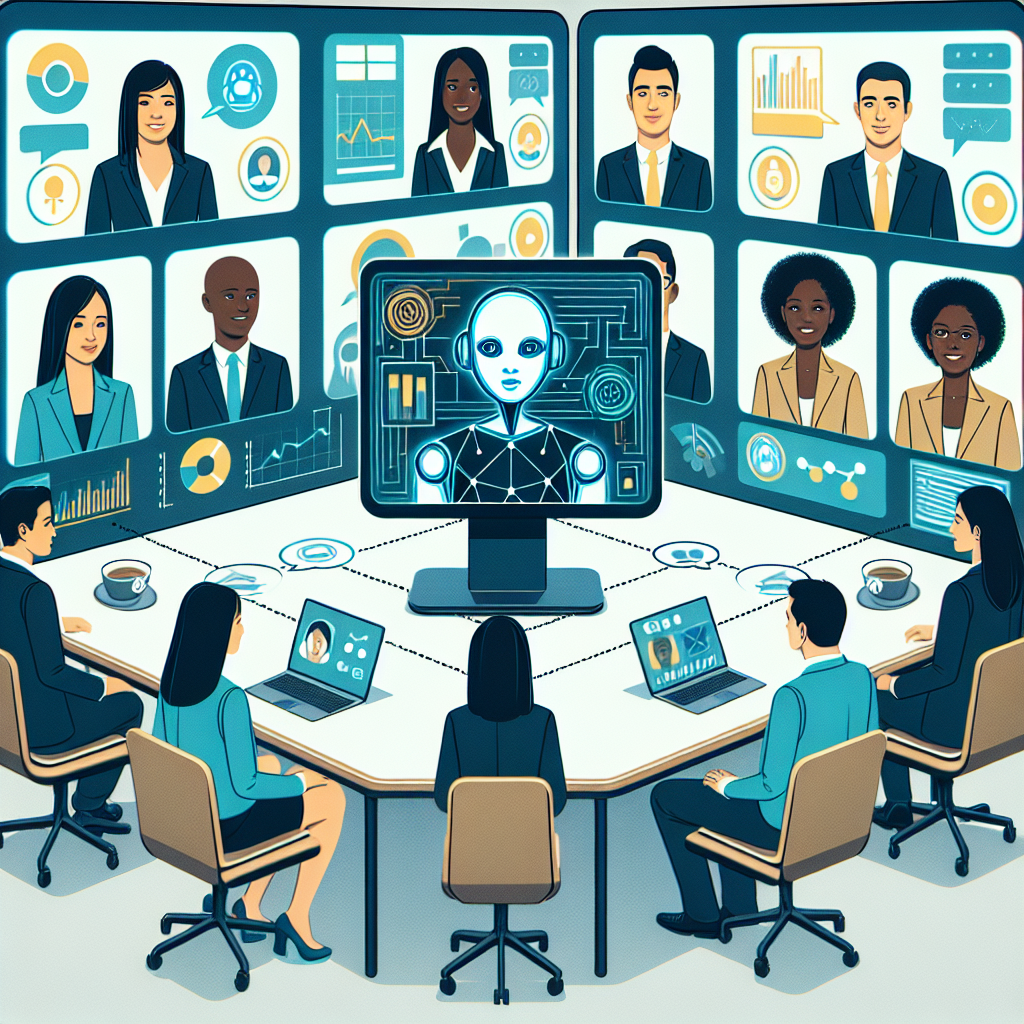
Modern technological advancements have lightly swept into the realm of communication, providing a ground-breaking base for improved multi-party interactions. Among these advancements, Artificial Intelligence (AI) stands iconically at the forefront, reshaping the way we conduct meetings and manage conference calls. One of the most compelling manifestations of AI in this area is the rise of AI-managed conference calls.

A conference call, as we know, is a telephone call involving three or more people. It plays a crucial role in various entities, such as businesses, NGOs, educational institutions, and more for significant strategic discussions. However, traditional methods of managing these calls can lead to a range of problems, such as miscommunication, time management issues, and the inability to accurately record minutes. This is where AI steps in, lending us an intelligent hand.
With AI integration in conference calling systems, we can automate and streamline these communication processes, circumventing earlier issues and enhancing productivity. AI-driven programs can seamlessly handle tasks that humans find daunting or time-consuming. For instance, they can transcribe calls, schedule meetings, highlight key points, send out minutes, and even interpret non-verbal cues like tone of voice or emotion. Essentially, AI-managed conference calls bridge the gap between digital technology and human-like understanding, facilitating efficient and effective meetings.
Considering the current realm of remote work and digital communication, AI-managed conference calls serve as a powerful tool to transform the way we communicate in a multi-party setting.
In the upcoming sections of this article, we will delve into how AI is creating a wave in conference call management, the many benefits it offers, some solutions on the market, and finally, looking towards the future of AI-managed conference calls.
In the dynamic world of professional communication, AI-managed conference systems have emerged as a game-changer, especially during multi-party communications. These systems leverage cutting-edge artificial intelligence capabilities to streamline conference call experiences and significantly enhance productivity. A few amongst these capabilities are automatic transcription, real-time sentiment analysis, and language translation.
One of the most compelling features of AI-managed conference systems is automatic transcription. This feature eliminates the need for manual note-taking, as it transcribes every word spoken during the conference call in real-time. The result is a word-for-word written record of the call, which can be easily referenced or shared with others who couldn't make the call.
Another groundbreaking feature of AI-managed conference calls is the real-time sentiment analysis. This intelligent feature reads the tone, language, and context of the conversation to determine the participants' emotional state. It provides valuable insights, allowing meeting hosts to better understand and respond to the group's dynamic and attitudes.
In today's global landscape, multi-lingual meetings are more common than ever. AI-managed conference systems step in here and offer language translation. This feature translates speech from one language to another in real-time, demolishing language barriers and resulting in seamless, efficient communication.
Thus, these AI-managed conference systems ensure smoother interactions, improved comprehension, efficient decision making, and ultimately more productive meetings. The combination of automatic transcription, real-time sentiment analysis, and language translation offers a more accessible, inclusive, and efficient communication environment. These systems are undoubtedly revolutionizing the future of multi-party communications.
The rise of AI-managed conference calls has revolutionized business communications. These technologically advanced systems are not only improving the quality and efficiency of multi-party communications but are also redefining productivity by integrating with the prevailing business tools. With this integration, businesses are accomplishing a new level of synergy in their operations, underscoring the value of AI-configured conference calls.

One of the most prominent features of AI-managed conference calls is their ability to seamlessly integrate with CRM (Customer Relationship Management) systems. This critical integration allows businesses to utilize customer data during calls, enabling informed discussions and decisions. Companies like MeetingSphere and VoiceBase are offering such revolutionary solutions.
Further, these AI-enabled conference calls can also interact with various project management tools. They can update tasks automatically based on the discussions held during the call. This auto-updation prevents time wastage and enhances business efficiency. CLIP OS is one of the pioneers leveraging this provision.
AI-managed conference calls are also finding great compatibility with calendars. They can schedule, reschedule or cancel meetings based on the availability of the participants and send prompt reminders to everyone involved. Organizations using Zoom.ai or x.ai are already reaping the benefits of such integrations.
By integrating AI-managed conference calls with the prevailing business tools, companies are unlocking unprecedented efficiency, collaboration and productivity. The technology is not just improving multi-party communications but is orchestrating a seamless business ecosystem, affirming that the future of business communications is shaped by Artificial Intelligence.
Organizations across various sectors are increasingly harnessing the capabilities of artificial intelligence to optimize their multi-party communications, especially conference calls. Let's delve into some successful implementations of AI-managed conference calls.
One notable example is Zoom. The company's AI-driven feature, dubbed Smart Gallery uses machine learning to present each participant individually during multi-party calling, thereby enhancing user engagement through a personalized calling experience. However, maintaining consistency in dynamic network conditions posed a challenge that was later overcome by advanced AI algorithms.
Another noteworthy instance is Microsoft Teams that optimizes the multi-party calling experience using AI capabilities. Its AI offers live captions, highlight transcription, and post-call summaries, thus ensuring effective communication and record-keeping. The initial challenge was efficiently managing a diverse set of data and languages, which was successfully addressed using diverse training data for the AI models.
The implementation of the Ujet virtual agent in customer support operations also stands asignificant example of AI's successful integration. This AI model efficiently manages multi-party conference calls to ensure optimal customer interaction and satisfaction. Despite the challenge of handling immense customer data, their AI schema has effectively designed to maintain data security and customer privacy.
Finally, Voicea's EVA (Enterprise Voice Assistant) represents AI's transformative role in managing conference calls. EVA uses AI to offer voice-activated assistance during calls, which significantly improved the communication efficacy. The primary challenge was seamless real-time assistance, which the company managed to overcome through extensive AI training.
In conclusion, while challenges exist with respect to data management, network consistency, and real-time assistance, companies like Zoom, Microsoft, Ujet, and Voicea have demonstrated successfully that AI's role in managing conference calls can improve the efficiency and productivity of multi-party communication.
The landscape of corporate communication is set to witness an unprecedented transformation in the coming years, triggered by the innovative leap in Artificial Intelligence (AI) technology. As predicted by experts, AI is poised to redefine multi-party communications, in particular, the conception and execution of conference calls.
Seamless integration of AI functionalities into conference calls can lead to myriad benefits. The most notable ones include improved efficiency, minimization of miscommunications, and streamlined information flow. Leveraging AI algorithms for real-time translation can break down language barriers in multinational corporate interactions. (source). Furthermore, the application of AI algorithms for automated transcription and data analysis can render more productive conference calls by ensuring that key points are not missed, and all participants are duly updated. (source).

Beyond the immediate merits, AI-managed conference calls are paving the way for futuristic communication strategies. AI's potential to synthesize massive datasets can enable predictive trend analysis in real-time during conference calls, thereby fostering proactive decision-making and strategic planning. (source). AI’s ability to gauge emotion and sentiment analysis could also revolutionize interpersonal dynamics in multi-party communications. (source).
While the promise of AI-managed conference calls is immense, the transition to this new paradigm also presents an array of challenges. Privacy concerns, data handling, and technological adaptability must be addressed effectively to ensure smooth integration. In conclusion, the key to harnessing the transformative power of AI lies in striking the right balance between leveraging its benefits and addressing its challenges with responsibility and foresight. (source).
The game-changing potential of AI in corporate communication is just at the precipice of realization. As complexities in corporate enterprises evolve, AI-managed conference calls may soon become the new norm bringing about a paradigm shift in business communication. Only time will tell how AI will reshape the means of global commerce and trade communication. (source).
In conclusion, the integration of AI in conference calls has revolutionized multi-party communications drastically. As AI continues to evolve, businesses stand to benefit greatly from its numerous advantages. Leveraging this technology has improved the quality of conference calls, streamlined coordination and increased overall productivity.See more benefits here.
With speech-to-text transcriptions that provide an accurate record of meetings, engagement has been enhanced. Every participant's voice is important, and AI ensures this by accurately capturing all contributions during the call. This, together with sentiment analysis, helps identify key points of discussion, ensuring all attendees remain on the same page post-call.Research more on AI Transcriptions here.
Through intelligent scheduling and automatic notifications, AI-managed conference calls reduce time wastage, leading to improved productivity. Furthermore, AI assists in managing challenges that stem from differences in time zones, thereby ensuring the calling process runs smoothly for all parties involved.Read more on AI Scheduling here.
The future of business communication rests in the power of AI. Its continuous evolution presents an exciting prospect for the enhancement of multi-party communications. As businesses adapt to this digitized landscape, the efficiency, convenience, and productivity benefits offered by AI-managed conference calls simply cannot be ignored.Explore more about the future of AI in Business here.
Thus, to stay competitive and continue to thrive in this rapidly evolving digital world, businesses must leverage the power of AI in conference calls.
Start your free trial for My AI Front Desk today, it takes minutes to setup!








